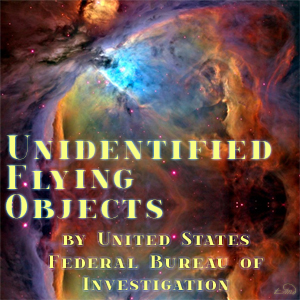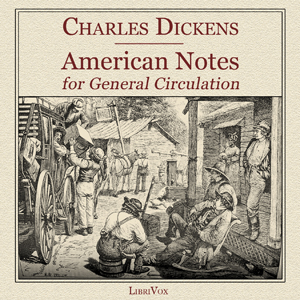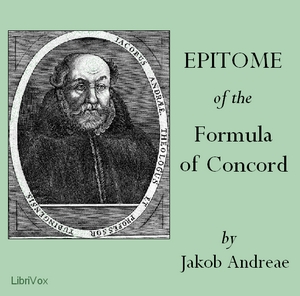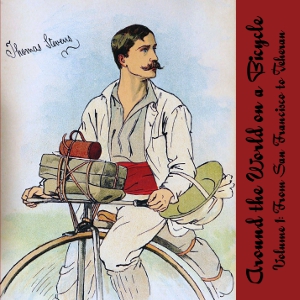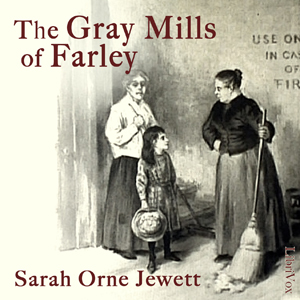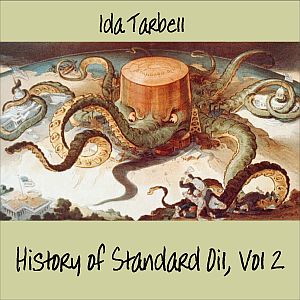Youth is the third in Tolstoy's trilogy of three autobiographical novels, including Childhood and Boyhood, published in a literary journal during the 1850s. (Introduction by Bill Boerst)
11 episodes
Through the U.S. Freedom of Information Act (FOIA) this series of communications has been de-classified and made public. Most names have been omitted, however much information of the sightings of UFOs in 1947 can be gleaned from these communications which were primarily between the FBI and other U.S. Government and military organizations.
It should be noted that the U.S. Air Force only became a separate entity in 1947, having split from the U.S. Army at that time. And they became very busy times for the fledgling military organization. The slant of this de-classified material is chiefly written communications between the FBI and the military machine in 1947. Correspondence herein spans July and August of 1947 which will forever remain as the beginning of serious first-hand UFO experience in the annals of history. (Introduction by Roger Melin)
6 episodes
When Mary Lennox, who has been brought up in India in a spoiled manner, is orphaned she has to move to Yorkshire, England, to live with her uncle in Misselthwaite Manor. Here she is treated much differently than she was in India - she is able to make friends with children her own age, one of these being her sickly cousin, Colin Craven (Introduction by ashleighjane)
27 episodes
Maria W. Stewart was America's first black woman political writer. Between 1831 and 1833, she gave four speeches on the topics of slavery and women's rights. Meditations From The Pen of Mrs. Maria W. Stewart—published in 1879, shortly before her death—is a collection of those speeches as well as her memoir, some meditations and prayers. They are political, poetical and sermon all at the same time; but in the mileu in which she lectured, they were a critically important part of the abolitionist movement years before the contributions of others such as Frederick Douglass and Sojourner Truth. Her speeches and essays espoused a return to Christian values and morality, but also proposed fundamental changes in gender roles in the midst of tremendous public opposition to the rights of blacks and of women. (Introduction by James K. White)
15 episodes
Habits that Handicap is one of three novels about alcoholism and drug addiction written by Charles B. Towns. Towns was an expert on alcoholism and drug addiction who helped draft drug control legislation in the United States during the early 20th century. He also founded the Towns Hospital in New York City, which aimed at drying out the well-to-do patient. (Summary by Guero and Wikipedia.)
16 episodes
American Notes for General Circulation is a travelogue by Charles Dickens detailing his trip to North America from January to June, 1842. While there he acted as a critical observer of these societies almost as if returning a status report on their progress. This can be compared to the style of his Pictures from Italy written four years later, where he wrote far more like a tourist. His American journey was also an inspiration for his novel Martin Chuzzlewit. (Summary by Wikipedia)
22 episodes
"Married Love" is one of the most famous 'sex education' manuals. First published in 1918, it sold tens of thousands of copies, and was one of the first publications to openly discuss issues such as variations in male and female sexual desire in a form which could be easily read and understood by the ordinary reader. This is the 6th, revised and expanded, edition, from 1919. The main text is mostly unchanged. An appendix has been added with some extra information on subjects such as sex during pregnancy. (Summary by Archive.org.)
14 episodes
Phineas Taylor Barnum (July 5, 1810 – April 7, 1891) was an American showman, businessman, and entertainer, remembered for promoting celebrated hoaxes and for founding the circus that became the Ringling Bros. and Barnum & Bailey Circus.His successes may have made him the first "show business" millionaire. Although Barnum was also an author, publisher, philanthropist, and for some time a politician, he said of himself, "I am a showman by profession...and all the gilding shall make nothing else of me," and his personal aims were "to put money in his own coffers". (Reference: Wikipedia.org)
21 episodes
The Chemical History of a Candle is a series of 6 lectures on chemistry presented to a juvenile audience in 1848. Taught by Michael Faraday - a chemist and physist, and regarded as the best experimentalist in the history of science - it is probably the most famous of the Christmas Lectures of the Royal Society.
Taking the everyday burning of a candle as a starting point, Faraday spans the arc from combustion and its products, via the components of water and air (oxygen, hydrogen, nitrogen, carbon), back to the type of combustion that happens in the human body when we breathe.
The final lecture "On Platinum" describes a then new method to produce large quantities of Platinum. It was delivered before the Royal Institution on February 22, 1861. (Summary by Availle.)
8 episodes
As Russia goes to war against Japan, Tolstoy urges those at all levels of society, from the Tsar down to the common soldier, to consider their actions in the light of Christ's teaching. "However strange this may appear, the most effective and certain deliverance of men from all the calamities which they inflict upon themselves and from the most dreadful of all—war—is attainable, not by any external general measures, but merely by that simple appeal to the consciousness of each separate man which, nineteen hundred years ago, was proposed by Jesus—that every man bethink himself, and ask himself, who is he, why he lives, and what he should and should not do." (Introduction by David Barnes, and extract from Chapter VI)
12 episodes
The Woodpeckers is a wonderful introduction to the world of bird study for the young naturalist, covering such topics as how he finds food, courting, how he builds his nest, the interesting ways he uses his different body parts as tools, among other topics discussed in the book.If you wish to investigate further, the online text has a few diagrams and an Appendix that contains more technical information such as detailed descriptions of the different species of North American woodpeckers which were not read as part of this audiobook.
(summary by Laura Victoria)
17 episodes
A history of France from Ancient Gaul up until 1880, written in short easy to comprehend chapters aimed at teaching English children. (Summary by Guero)
52 episodes
This bittersweet tragicomedy centers on an odd triangle of characters: Basil Ransom, a political conservative from Mississippi; Olive Chancellor, Ransom's cousin and a Boston feminist; and Verena Tarrant, a pretty, young protégée of Olive's in the feminist movement. The storyline concerns the struggle between Ransom and Olive for Verena's allegiance and affection, though the novel also includes a wide panorama of political activists, newspaper people, and quirky eccentrics.(Summary by Wikipedia)
42 episodes
Do you know the difference between sedimentary, igneous and metamorphic rocks? Are you interested in their geologic origin, chemical composition or how each type affects the landscape? Do you know the differences between limestone, granite and marble as building materials? You will find these and lots of other interesting facts about rocks in this second edition of "Rocks and Their Origins" published in 1922. The author, Grenville A. J. Cole, was an English geologist, Professor of Geology in the Royal College of Science for Ireland and an avid cyclist. (summary by J. M. Smallheer)
15 episodes
Formula of Concord (1577) is an authoritative Lutheran statement of faith (called a confession, creed, or "symbol") that, in its two parts (Epitome and Solid Declaration), makes up the final section of the Lutheran Corpus Doctrinae or Body of Doctrine, known as the Book of Concord. The Epitome is a brief and concise presentation of the Formula's twelve articles. (Introduction by Wikipedia)
13 episodes
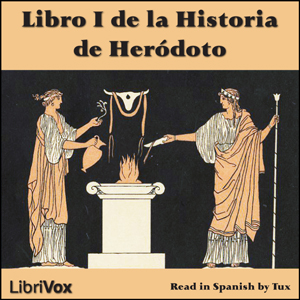
Las Historias (en griego antiguo ἱστορίαι historíai 'aproximaciones, investigaciones') de Heródoto de Halicarnaso (484–después del 430 a. C.) es una obra escrita en dialecto jonio que tiene como objetivo narrar los enfrentamientos que tuvieron lugar entre griegos y bárbaros (asiáticos, especialmente persas) y, en concreto, las Guerras Médicas. También contiene una descripción de la historia y costumbres del Antiguo Egipto. Se trata de la primera obra historiográfica griega que nos ha llegado íntegra y está dividida en nueve libros, cada uno de ellos dedicado a una musa. En el proemio Heródoto expone su intención: evitar que las hazañas de las generaciones que lo precedieron sean relegadas al olvido (I 1), explicando las causas de sus enfrentamientos. Para exponer las causas del conflicto (las Guerras Médicas), Heródoto pasa a abordar las primeras diferencias y enfrentamientos que se produjeron entre griegos y bárbaros en época mítica (secuestros de Europa, Medea y Helena, Guerra de Troya). Sin embargo, marca cierta distancia con estas tradiciones y acto seguido indica quién, por lo que él sabe, cometió en primer lugar actos injustos (Creso, rey de Lidia). Tenemos, pues, expuesta nítidamente que la agresión es la medida de la responsabilidad moral y jurídica. La atención pasa inmediatamente a la figura de Creso, el primer agresor. La historia de Lidia permite entrar en contacto con el gran eje de su Historia, Persia; al mismo tiempo, sienta las bases de su concepción teleológica del acontecer humano (entrevista entre Solón y Creso, I 28–33). El resto del libro I traslada su atención a Persia, con la entronización de Ciro y diversas campañas de este rey (sumisión de Jonia, Caria y Licia). (Resumen de Wikipedia)
18 episodes
"Histories are more full of examples of the fidelity of dogs than of friends."
The character, sensibilities, and intellectual faculties of animals have always been a favourite study, and they are, perhaps, more strongly developed in the dog than in any other quadruped, from the circumstance of his being the constant companion of man. I am aware how much has been written on this subject, but having accumulated many original and interesting anecdotes of this faithful animal, I have attempted to enlarge the general stock of information respecting it.
It is a pleasing task, arising from the conviction that the more the character of the dog is known, the better his treatment is likely to be, and the stronger the sympathy excited in his behalf.
(Summary by Edward Jesse, extracted from the Preface)
37 episodes
The main idea of "Socialism: Utopian and Scientific" (1880) was distinguishing scientific socialism and utopian socialism. Engels begins by chronicaling the thought of utopian socialists, starting with Saint-Simon. He then proceeds to Fourier and Robert Owen. In chapter two, he summarizes dialectics, and then chronicles the thought from the ancient Greeks to Hegel. Chapter three summarizes dialectics in relation to economic and social struggles, essentially echoing the words of Marx.
(Introduction by Wikipedia)
4 episodes
The county of Lancashire in the north-west of England is best known as the engine room of the nineteenth-century Industrial Revolution. Steering clear of the industrial districts, F. A. Bruton takes the reader on an engaging tour of the county's beauty spots and lesser known landscapes. Taking the view that the charm of a district is nothing without its historical associations, Bruton packs his account with historical detail and literary references to, among others, Leland, Wordsworth, Ruskin, Arnold, and Mrs. Carlyle. (Introduction by Phil Benson)
16 episodes
A Merchant talks about daily life inside prisons of England, describes routines and how prisoners are treated. He notes stories of how fellow prisoners came to be in prison, and his ideas about the penal system, its downfalls and ways to improve it. The reader can see similarities to the problems we still have in regarding "criminals" today. (Introduction by Elaine Webb)
20 episodes
A biography of Abraham Lincoln by his long-time law partner, William Herndon and Herndon's collaborator, Jesse Weik. The book is notable for its extensive use of first hand interviews (unusual for its time) and for Herndon's overriding determination to convey an affectionate but frank picture of his law partner's life story as remembered by Lincoln's family, friends, associates and neighbors. (Summary by RalphK)
36 episodes
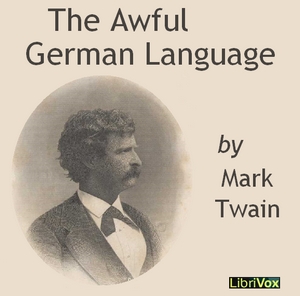
This long essay is a work of mock philology, one of several appendices to Twain’s travel novel, A Tramp Abroad. In it, Twain explains, complains about, and shows how one might improve upon various aspects of the (awful) German language. His examples of precisely how the German language is awful include the famed “separable verb” – which allows one to put the first part of a given verb at the beginning – and its second part at the end – of a given clause or sentence (which may, indeed, be very long). He also makes fun of the extreme length of certain compound nouns (which are created by tacking two – or more – words together, without using hyphens to clarify where one ends and the next begins), as well as the many noun and verb forms one must master (memorize) in order to use German cases properly.
As the essay progresses, Twain includes a few hilarious passages that are partly or mostly in (his own, awful) German. Nevertheless, the work is easily understandable even by people who don’t know any German at all.
(In the novel, A Tramp Abroad, Twain details his journey with his friend, Harris, through Germany, the Alps, and Italy, where he encounters various ridiculous situations. Here, much of the humor lies in his silly, often over-stated characterization of the circumstances as quickly grasped and easily explained by such a seasoned tourist as himself, while he also make plain throughout the profoundly strange nature of many of his experiences, and the various pitfalls he and Harris run into as they try to navigate their unfamiliar terrain.) (Introduction by Kirsten Wever)
8 episodes

Birdseye Views of Far Lands is an interesting, wholesome presentation of something that a keen-eyed, alert traveler with the faculty of making contrasts with all classes of people in all sorts of places, in such a sympathetic way as to win their esteem and confidence, has been able to pick up as he has roamed over the face of the earth for a quarter of a century.The book is not a geography, a history, a treatise on sociology or political economy. It is a Human Interest book which appeals to the reader who would like to go as the writer has gone and to see as the writer has seen the conformations of surface, the phenomena of nature and the human group that make up what we call a "world."The reader finds facts indicating travel and study set forth in such vigorous, vivid style that the attention is held by a story while most valuable information is being obtained. The casual reader, the pupil in the public school and student in the high school, professional men and women, will all find the book at once highly interesting and instructive. In no other book with which I am acquainted can so much that is interesting be learned of the world in so short time and in such a pleasing way.Teachers in rural schools will find the book especially helpful. It will inspire the pupils in the upper grades in these schools to do some observation work themselves and to in this manner seek to learn their own localities better, while at the same time it will suggest the collection of materials about other countries, their peoples, products, characteristics and importance from sources other than text books.Every rural school as well as every high school and public library in the land should have one or more copies of this book. (Summary from book's Introduction.)
28 episodes
Public Opinion (1922), by Walter Lippman, is a critical assessment of functional democratic government, especially the irrational, and often self-serving, social perceptions that influence individual behavior, and prevent optimal societal cohesion. (Introduction by author)
28 episodes

On the Soul (Greek Περὶ Ψυχῆς (Perì Psūchês), Latin De Anima) is a major treatise by Aristotle on the nature of living things. His discussion centres on the kinds of souls possessed by different kinds of living things, distinguished by their different operations. Thus plants have the capacity for nourishment and reproduction, the minimum that must be possessed by any kind of living organism. Lower animals have, in addition, the powers of sense-perception and self-motion (action). Humans have all these as well as intellect. The notion of soul used by Aristotle is only distantly related to the usual modern conception. He holds that the soul is the form, or essence of any living thing; that it is not a distinct substance from the body that it is in; that it is the possession of soul (of a specific kind) that makes an organism an organism at all, and thus that the notion of a body without a soul, or of a soul in the wrong kind of body, is simply unintelligible. (He argues that some parts of the soul—the intellect—can exist without the body, but most cannot.) It is difficult to reconcile these points with the popular picture of a soul as a sort of spiritual substance "inhabiting" a body. (Adapted from Wikipedia)
8 episodes
Spiritual and practical lessons are extracted from every verse of the Book of Matthew, as well as detailed explanation of the text. The Book of Matthew is part of the New Testament in the Holy Bible and is one of the four gospels. The other 3 gospels are Mark, Luke, and John. Matthew was a tax collector before becoming a disciple of Jesus Christ. The style of his gospel suggests that he was directing his message to Jewish readers. His work aims to systematically prove that Jesus Christ is the messiah who has been prophesied about in the Old Testament. He did this by revealing each prophecy in that book fulfilled by Jesus Christ. (Summary by Nadege Bernard)The Book Coordinators for this project included: Rob Paire, Samantha J Gubitz, Fiddlesticks, and Barry Eads.The Proof Listeners for this project included: Annise, Fiddlesticks, Barry Eads, and Elijah.The Meta Coordinators for this project included: Annise and Barry Eads.
28 episodes
The recollections of a British infantryman who served in the British army during the Napoleonic Wars. ( Summary by Graham Keeling)
17 episodes
Thomas Stevens was the first person to circle the globe by bicycle, a large-wheeled Ordinary. His journey started in April 1884 in San Francisco from where he cycled to Boston to take a steamer to England. Crossing England, France, Central Europe and Asia Minor before he was turned back at the borders of Afghanistan. He returned part of the way to take a ship to Karachi, from where he crossed India. Another steam ship brought him from Calcutta to Hong Kong, and from Shanghai he set over to Japan, finally ending his journey after actually cycling 13.500 miles in Yokohama, December 1886.
This is the first volume of his travel experiences, detailing the part of the journey from San Francisco to Teheran, where he spent the winter. (Summary by Availle)
45 episodes

While Belgium is bleeding and hoping, while Poland suffers and dreams of liberation, while Serbia is waiting for redemption, there is a little country the soul of which is torn to pieces—a little country that is so remote, so remote that her ardent sighs cannot be heard.It is the country of perpetual sacrifice, the country that saw Abraham build the altar upon which he was ready to immolate his only son, the country that Moses saw from a distance, stretching in beauty and loveliness,—a land of promise never to be attained,—the country that gave the world its symbols of soul and spirit. Palestine!No war correspondents, no Red Cross or relief committees have gone to Palestine, because no actual fighting has taken place there, and yet hundreds of thousands are suffering there that worst of agonies, the agony of the spirit.Those who have devoted their lives to show the world that Palestine can be made again a country flowing with milk and honey, those who have dreamed of reviving the spirit of the prophets and the great teachers, are hanged and persecuted and exiled, their dreams shattered, their holy places profaned, their work ruined. Cut off from the world, with no bread to sustain the starving body, the heavy boot of a barbarian soldiery trampling their very soul, the dreamers of Palestine refuse to surrender, and amidst the clash of guns and swords they are battling for the spirit with the weapons of the spirit.The time has not yet come to write the record of these battles, nor even to attempt to render justice to the sublime heroes of Palestine. This book is merely the story of some of the personal experiences of one who has done less and suffered less than thousands of his comrades.(Summary from the Introduction)
11 episodes
Altamirano nos da a creer que este cuento es una historia verídica, que le fue contada por el narrador. Es, simplemente, la historia de un soldado que se encuentra con un cura en las montañas el día de Nochebuena, y pasa con él y con su pueblo la noche de fiestas. (Resumen de Karen Savage)
11 episodes
In The Feast of St. Friend, a Christmas book, Arnold Bennett shares his views on Christmas as the season of goodwill. As always, Bennett's writing includes some thought-provoking ideas liberally spiced with his wry sense of humour, and as always too, you can barely believe it was written so long ago. This was published exactly 100 years ago, in 1911. (Introduction by Ruth Golding)
10 episodes
An unlikely pair of wanderers they were; the orphan girl Lou and her travelling partner Jim Botts. Jim appeared in need of following some apparent 'rules' during the journey, while Lou seemed in need of better clothing, and perhaps some refinement. But who was most benefitting whom on the week-long journey from rural village to big city? And which of the two was willing to try anything once? (Introduction by Roger Melin)Written by Isabel Ostrander under the pseudonym Douglas Grant.
9 episodes
As contemporary today as it was over a century ago, this relatively unsentimental tale of labor relations still packs a punch. (Summary by BellonaTimes)
6 episodes
This is a nice collection of 52 kid-aimed sermons by missionary Wright while he served in the Philippines in the World War I era. Each offers a slice-of-life reference point, an appropriate Bible verse, and hymn. (Summary by BellonaTimes)
53 episodes

The Chinese Union Version (CUV) (Chinese: 和合本; pinyin: héhé běn; literally "harmonized/united version") is the predominant Chinese language translation of the Bible used by Chinese Protestants. It is considered by many to be the Chinese Protestant’s Bible.The CUV was translated by a panel with members from many different Protestant denominations, using the English Revised Version as a basis and original manuscripts for crosschecking. Work on the CUV began in 1890 and originally three versions of the CUV were planned: two classical Chinese versions and a vernacular Mandarin version. The CUV was completed in 1919, with one amalgamated classical Chinese translation and one vernacular Mandarin translation. With the onset of May Fourth Movement, and the associated New Culture Movement, the CUV is the first translated work to be published in Vernacular Chinese.The CUV in use today is the vernacular Mandarin version, published in two slightly different editions: the Shen Edition (神版) and the Shangti Edition (上帝版), differing in the way the word "God" is translated.《聖經和合本》(簡稱和合本;今指國語和合本,舊稱官話和合本),是今日華語人士最普遍使用的《聖經》譯本。此譯本的出版起源自1890年在上海舉行的傳教士大會,會中各差會派代表成立了三個委員會,各自負責翻譯官話、淺文理及深文理(文言文)譯本。於1904年,《淺文理和合譯本》出版《新約》。《深文理和合譯本》於1906年出版《新約》。1907年大會計劃只譯一部文理譯本,於1919年出版《文理和合譯本》。1906年,官話的翻譯工作完成了《新約》;1919年,《舊約》的翻譯工作完成。在1919年正式出版時,《聖經》譯本名為《官話和合譯本》,從此就成了現今大多數華語教會採用的和合本《聖經》。(Summaries from Wikipedia)
14 episodes
This appendix to the 1580 edition of the Book of Concord is a compilation of Scripture passages together with citations from the fathers of the ancient Christian Church. They are intended to show that the Christology of the Formula of Concord differs neither in substance nor in terminology from Christian Orthodoxy. (Introduction by Jonathan Lange)
8 episodes
A collection in celebration of 2012 Year of Reading Australia. Readers chose fiction, non fiction and poetry - we only asked that the readings should have some sort of Australian hook. So they can be by an Australian author, or about Australia, or just have a prominent bit of Australianess in the plot. Failing that: even being performed by Australians will do! And that the works should be PD in Australia and the U.S.A. Introduction by Annise
30 episodes
The History of the Standard Oil Company is a book written by journalist Ida Tarbell in 1904. It was an exposé of the Standard Oil Company, run at that time by oil tycoon John D. Rockefeller, the richest figure in America's history. Originally serialized in 19 parts in McClure's magazine, the book was a seminal example of muckraking, and inspired many other journalists to write about trusts, large businesses that (in the absence of strong antitrust law in the 19th century) attempted to gain monopolies in various industries. The History of the Standard Oil Company was credited with hastening the breakup of Standard Oil, which came about in 1911. ( Summary by Wikipedia )Note: This reading does not include any of the Appendices.
13 episodes

The Chymical Wedding of Christian Rosenkreutz was edited in 1616 in Strasbourg (annexed by France in 1681). It is the third of the original manifestos of the mysterious "Fraternity of the Rose Cross" (Rosicrucians).NOTE: It was translated into English for the first time in 1690 by E. Foxcroft. This translation became the source for many of the modern attempts to improve the original. The translation presented here is that of E. Foxcroft.Although the book first appeared in 1616, the story takes place over 150 years earlier. It is an allegoric romance (story) divided into Seven Days, or Seven Journeys, like Genesis, and tells us about the way Christian Rosenkreuz was invited to go to a wonderful castle full of miracles, in order to assist the Chymical Wedding of the king and the queen, that is, the husband and the bride. The story begins on an evening near Easter. In the final chapter—the seventh day—CRC is knighted; the year is 1459. It was on Easter-day 1459 that the Constitutions of the Freemasons of Strasburg was first signed in Regensburg, with a second signed shortly afterwards in Strasburg. The Gutenberg Bible began printing in Mainz, Germany in 1455, and the first Bible in German, the Mentel Bible, was printed in Strasburg in 1466. The invitation to the royal wedding includes the Monas Hieroglyphica associated with John Dee. (Summary by Wikipedia.org)
4 episodes
This book presents a method of developing and strengthening the faculties of the mind, through the awakened will, by a simple, scientific process possible to any person of ordinary intelligence (Summary by Charles Godfrey Leland) Note: This book was first entitled Have You a Strong Will? In essence, it describes "the secret", the power of positive thinking, and the method of changing your thinking.
14 episodes
In the following pages an attempt has been made to examine anew in the light of God's Word some of the profoundest questions which can engage the human mind. (Summary by Arthur Pink)
25 episodes
A fascinating and classic Victorian ethnology of SE Asia, first published in 1869. The author was co-discoverer of evolution, together with Darwin. (Summary by Nicholas Longhurst)
21 episodes
Thomas Stevens was the first person to circle the globe by bicycle, a large-wheeled Ordinary. His journey started in April 1884 in San Francisco from where he cycled to Boston to take a steamer to England. Crossing England, France, Central Europe and Asia Minor before he was turned back at the borders of Afghanistan. He returned part of the way to take a ship to Karachi, from where he crossed India. Another steam ship brought him from Calcutta to Hong Kong, and from Shanghai he set over to Japan, finally ending his journey after actually cycling 13.500 miles in Yokohama, December 1886.
This is the second volume (of two) relating his travel experiences, detailing the part of the journey from Teheran to Yokohama. (Summary by Availle)
44 episodes
The Christian Book of Concord was published in 1580 as a collection of eleven documents: Three Ecumenical Creeds and eight documents from the Reformation Era. Here is the Preface to the entire work together with the Saxon Visitation Articles from 1592. (Summary by Jonathan Lange)
3 episodes
Faith and reason, love and virtue, morality and mortality! In these two short volumes the famous novelist, essayist, and playwright, Upton Sinclair, confided his most prized worldly wisdom for generations to come. His kind and witty personal advice both provokes and enlightens page by page. (Summary by Rom Maczka)
36 episodes

Inheritors, (1921) by American dramatist Susan Glaspell concerns the legacy of an idealistic farmer who wills his highly coveted midwest farmland to the establishment of a college (Act I.) Forty years later, when his granddaughter stands up for the rights of Hindu nationals to protest at the college her grandfather founded, she jeopardizes funding for the college itself and sets herself against her own uncle, president of the institution's trustees (Acts II & III.) Ultimately, she defies her family's wishes, and as a consequence is bound for prison herself (Act IV.) The play was a stirring defense of free speech and an individual's ability to stand for his or her own ideal during a time of aggressive anti-Communist politics in the US. Inheritors was first performed at Provincetown Playhouse in 1922, the last of Glaspell's plays presented there. It has been revived in New York City by Mirror Repertory in 1983 and Metropolitan Playhouse in 2005. (Summary by Wikipedia)Cast:Smith: Chris MarcellusGrandmother: Margaret EspaillatSilas Morton, Emil Johnson: AnthonyFelix Fejevary the First: AllenJohnsFelix Fejevary the Second: Rick Cahill, Robert HoffmanSenator Lewis, Ira Morton: Nathanial W.C. HigginsHorace Fejevary: Chuck WilliamsonDoris: Elizabeth KlettFussie: Liz BenningtonMadeline Fejevary Morton: Arielle LipshawIsabel Fejevary: Linette GeiselHarry: MichaelH-SHolden: Delmar H. DolbierNarrator: Amanda FridayAudio edited by Chuck Williamson
4 episodes
"This 1922 book by poet and sometime cultural critic Vachel Lindsay might have been the first to treat the then-new medium of moving pictures as an art form, one that was potentially as rich, complex, mysterious as far older ones, and whose physical and aesthetic properties were only starting to be understood. The highlight of the book might be “The Motion Picture of Fairy Splendor,” which examines the relationship between film storytelling, magic, myths, legends and bedtime stories. It’s discombobulating, in a good way, to read Lindsay’s attempts to grapple with what, precisely, cinema is. Being supposedly sophisticated 21st century people, we all feel as though we know what cinema is, and don’t need to have the basics explained to us, but this is really just vanity and ignorance talking. Bottom line: You haven’t really, seriously thought about movies — what they are, and what they can and cannot do, and become — until you’ve read this book." (Salon.com)
23 episodes
The history of New York City is told as a story, in few words. It begins with Henry Hudson's discovery of Manhattan in 1609. And it finishes in 1898 when the island of Manhattan becomes the Borough of Manhattan of Greater New York. (Summary by Guero.)
41 episodes
ivil Disobedience (Resistance to Civil Government) is an essay by American transcendentalist Henry David Thoreau that was first published in 1849. In it, Thoreau argues that individuals should not permit governments to overrule or atrophy their consciences, and that they have a duty to avoid allowing such acquiescence to enable the government to make them the agents of injustice. Thoreau was motivated in part by his disgust with slavery and the Mexican–American War. (Summary by Wikipedia)
2 episodes
The Autobiography of a Slander exposes the consequences of reckless words or, even worse, intentionally disparaging words. In this moral tale, told from the point of view of "the slander", Edna Lyall (pseudonym used by Ada Ellen Bayley) reveals her ideals and goals in life and relationships. (Summary by Rhonda Federman)
8 episodes

